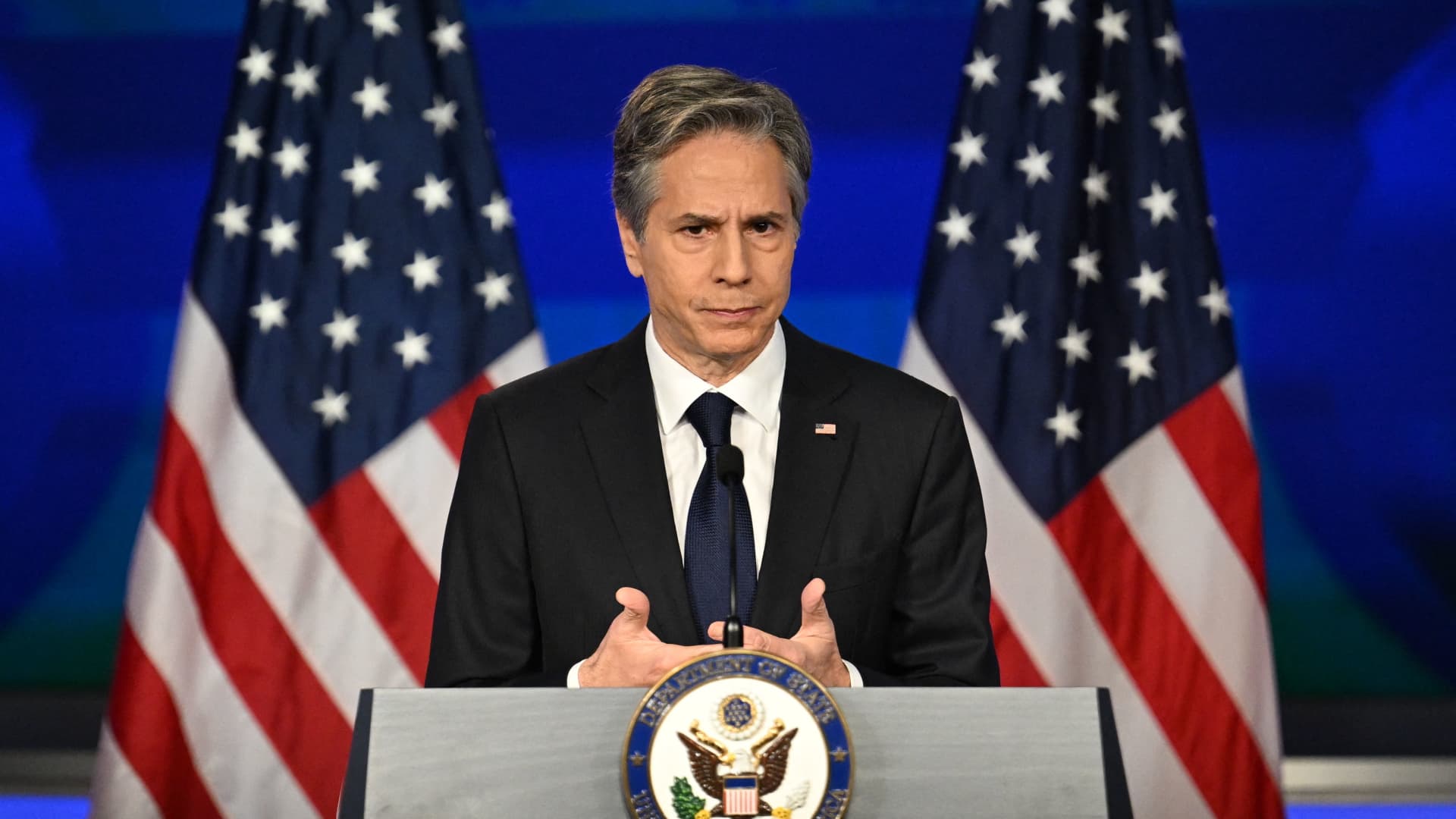Blinken says China is a serious long-term challenge but the U.S. does not want a new Cold War

WASHINGTON — Secretary of State Antony Blinken on Thursday described China as the “most serious long-term challenge to the international order,” even as the world grapples with Russia’s war in Ukraine.
“China is the only country with both the intent to reshape the international order and, increasingly, the economic, diplomatic, military and technological power to do it,” Blinken said in a speech at George Washington University.
“Beijing’s vision would move us away from the universal values that have sustained so much of the world’s progress over the past 75 years,” Blinken said.
The speech, which outlined the Biden administration’s policy toward China, comes as the U.S. warns the world’s second-largest economy not to help Moscow blunt global sanctions for the Kremlin’s invasion of Ukraine. It also follows a Biden administration effort to calm Beijing’s anger over Biden’s comment that the U.S. was willing to use its military to defend Taiwan.
Blinken reiterated that the U.S. policy has not changed and that the Biden administration remains committed to a “One China” policy, a diplomatic agreement that there is only one Chinese government but allows the U.S. to maintain an unofficial relationship with Taiwan.
“We do not support Taiwan independence, and we expect cross-strait differences to be resolved by peaceful means,” he said. “Our policy has not changed. What has changed is Beijing’s growing coercion, like trying to cut off Taiwan’s relations with countries around the world and blocking it from participating in international organizations.”
Blinken acknowledged that the U.S. will have to compete with China on multiple fronts but took steps to avoid ratcheting up tensions between the countries.
“We will align our efforts with our network of allies and partners acting with a common purpose and common cause and harnessing these two key assets,” Blinken said. “We will compete with China to defend our interests and our vision for the future.”
Blinken said that the U.S. will continue to make strategic investments in education, research, advanced manufacturing and infrastructure in order to challenge areas where Beijing attempts to lead the globe.
“We can get this done, and it can’t wait,” Blinken added, calling on U.S. lawmakers to pass relevant legislation, such as a bill to boost semiconductor manufacturing.
The top U.S. diplomat acknowledged that the U.S. and China will have a pivotal role to play in the global economy in one of the most “complex and consequential relationships” the U.S. has with any country. As the world’s two largest economies will have to deal with each other “for the foreseeable future,” the U.S. wants to avoid “conflict or a new Cold War,” Blinken said.
“We don’t seek to block China from its role as a major power, nor to stop China — or any country — from growing their economy or advancing the interests of their people,” he added.
The Chinese Embassy in Washington, D.C., did not immediately respond to CNBC’s request for comment.
Tensions between Beijing and Washington soared during the Trump administration. Former President Donald Trump placed blame squarely on China for a wide range of grievances, including intellectual property theft, unfair trade practices and the coronavirus pandemic.
Blinken on Thursday tried to downplay the strain between the two countries and said that the U.S. hopes to work together on pressing global challenges.
“We have profound differences with the Chinese Communist Party and the Chinese government, but those differences are between governments and systems and not between our people,” Blinken said.
“We respect their achievements and history, their culture, and deeply value the ties of family and friendship that connect us. And we sincerely wish for our governments to work together on issues that matter,” he added.
Blinken called out Beijing’s “perfected mass surveillance,” as well as human rights abuses in China’s Xinjiang region. The Biden administration has previously described the abuse of Uyghurs and members of other Muslim minorities in the region as “widespread, state-sponsored forced labor” and “mass detention.”
President Joe Biden has previously said that his administration is ready for “extreme competition” with China but that his approach would be different from that of his predecessor. He has also placed greater emphasis on working more closely with allies in order to push back against China — rather than taking steps to counter Beijing alone.
“We will confront China’s economic abuses,” Biden said during his first visit to the State Department in February. “But we’re also ready to work with Beijing when it’s in America’s interest to do so. We’ll compete from a position of strength by building back better at home and working with our allies and partners.”
The president has also said that during his political career he has spent more time with China’s Xi Jinping than any other world leader.




